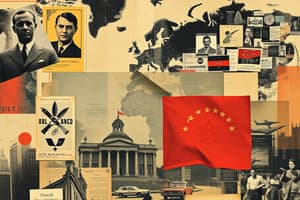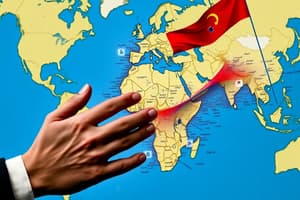Podcast
Questions and Answers
¿Cuál fue un resultado significativo de la Revolución Cubana-Estadounidense?
¿Cuál fue un resultado significativo de la Revolución Cubana-Estadounidense?
- Desencadenó la Primera Guerra Mundial
- Permitió a los Estados Unidos establecer su dominio global (correct)
- Llevó a la abolición de la esclavitud en Cuba
- Facilitó la independencia de Puerto Rico
¿Cuál fue un aspecto distintivo de la Primera Guerra Mundial?
¿Cuál fue un aspecto distintivo de la Primera Guerra Mundial?
- El establecimiento de una paz duradera en Europa
- El uso extendido de armas químicas (correct)
- La aplicación generalizada de la diplomacia internacional
- El predominio de tácticas de guerra submarina
¿Qué consecuencia significativa tuvo la Gran Depresión en los Estados Unidos?
¿Qué consecuencia significativa tuvo la Gran Depresión en los Estados Unidos?
- Una disminución en la inversión del gobierno en programas sociales
- Un aumento en los salarios y la riqueza para la mayoría de la población
- La implementación del New Deal para abordar la crisis económica (correct)
- El establecimiento de una economía basada en el trueque
¿Qué característica definió a la Revolución Rusa de 1917?
¿Qué característica definió a la Revolución Rusa de 1917?
¿Cuál fue una característica distintiva de la Revolución Industrial?
¿Cuál fue una característica distintiva de la Revolución Industrial?
¿Qué implicación tuvo el establecimiento de bases militares en el Caribe para los Estados Unidos durante su hegemonía?
¿Qué implicación tuvo el establecimiento de bases militares en el Caribe para los Estados Unidos durante su hegemonía?
¿Qué evento marcó el fin de la monarquía francesa y el ascenso de Napoleón Bonaparte?
¿Qué evento marcó el fin de la monarquía francesa y el ascenso de Napoleón Bonaparte?
¿Qué caracterizó a la Revolución Industrial en términos de producción?
¿Qué caracterizó a la Revolución Industrial en términos de producción?
¿Qué conflicto involucró a Estados Unidos y España en una breve guerra por el control de Cuba?
¿Qué conflicto involucró a Estados Unidos y España en una breve guerra por el control de Cuba?
¿Cuál de los siguientes eventos no ocurrió entre 1900 y 1930?
¿Cuál de los siguientes eventos no ocurrió entre 1900 y 1930?
¿Qué evento histórico tuvo un impacto significativo en la economía global y resultó en el ascenso de países industrializados como Gran Bretaña y Estados Unidos?
¿Qué evento histórico tuvo un impacto significativo en la economía global y resultó en el ascenso de países industrializados como Gran Bretaña y Estados Unidos?
¿Qué periodo histórico se caracterizó por la hegemonía estadounidense y eventos como la Primera Guerra Mundial y la Gran Depresión?
¿Qué periodo histórico se caracterizó por la hegemonía estadounidense y eventos como la Primera Guerra Mundial y la Gran Depresión?
Flashcards are hidden until you start studying
Study Notes
The years from 1900 to 1930 were marked by significant global events and changes, including the French Revolution, the Industrial Revolution, the Spanish-Cuban-American War, American hegemony, the Great Depression, the First World War, and the Russian Revolution.
French Revolution (1789-1799)
The French Revolution, which began in 1789, was a period of radical social and political upheaval in France. It was characterized by the end of the Bourbon monarchy, the rise of radical factions, and eventually the ascent of Napoleon Bonaparte. The revolution resulted in the widespread destruction of the French monarchy, the establishment of the First French Republic, and the eventual rise of the Napoleonic Empire.
Industrial Revolution (1760-1840)
The Industrial Revolution, which began in the late 18th century, was a period of significant technological and economic change. It was characterized by the shift from manual labor to mechanized production, the growth of factories, and the expansion of international trade. The Industrial Revolution had a profound impact on the global economy and led to the rise of industrialized nations like Britain and the United States.
Spanish-Cuban-American War (1898)
The Spanish-Cuban-American War was a brief conflict between the United States and Spain over control of Cuba. The war began in 1898 after the U.S. battleship Maine exploded in Havana harbor, and it ended with the Treaty of Paris, which ceded Guam, Puerto Rico, and the Philippines to the United States.
American Hegemony (1898-1945)
The period from 1898 to 1945 was characterized by American hegemony on the global stage. This was marked by the United States becoming a global power through its victory in the Spanish-American War, the establishment of military bases in the Caribbean, and the implementation of the Roosevelt Corollary to the Monroe Doctrine, which proclaimed a right for the United States to intervene to stabilize weak states in the Americas.
Great Depression (1929-1939)
The Great Depression, which began in 1929, was a period of severe economic hardship in the United States. It was characterized by high unemployment, low wages, and widespread poverty. The New Deal, which was implemented during Franklin D. Roosevelt's presidency, was a series of programs and policies designed to alleviate the effects of the depression.
First World War (1914-1918)
The First World War, which began in 1914, was a global conflict involving many of the world's major powers. It was characterized by trench warfare, chemical weapons, and the use of innovation technologies. The war ended with the signing of the Treaty of Versailles in 1919.
Russian Revolution (1917)
The Russian Revolution was a period of political and social upheaval in Russia. It began in 1917 with the overthrow of the Romanov dynasty and the establishment of a provisional government. However, the revolution was ultimately taken over by the Bolsheviks, led by Vladimir Lenin, who established the Soviet Union.
In conclusion, the years from 1900 to 1930 were marked by significant global events and changes, including the French Revolution, the Industrial Revolution, the Spanish-Cuban-American War, American hegemony, the Great Depression, the First World War, and the Russian Revolution. These events had a profound impact on the world and continue to shape our present day.
Studying That Suits You
Use AI to generate personalized quizzes and flashcards to suit your learning preferences.




